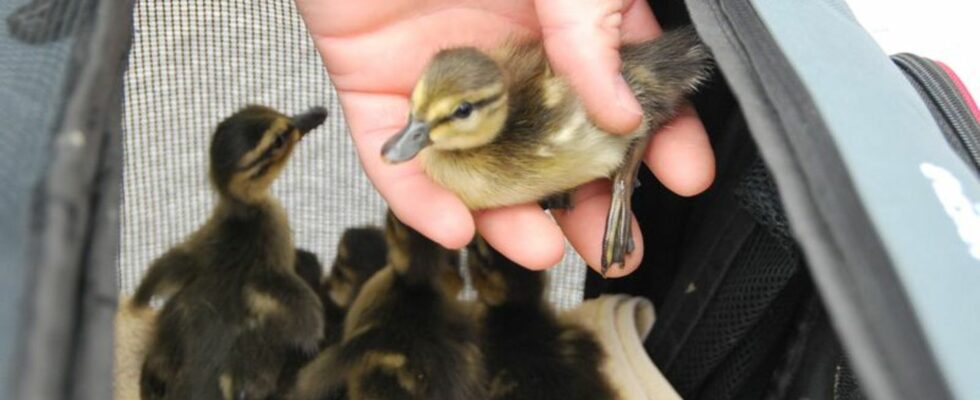Animals
Moving assistance for city ducks and their chicks
A mother duck and her ducklings are moving: it’s going to the Müggelspree. photo
© Anja Sokolow/dpa
When city ducks breed on balconies, roof terraces and in backyards, there is a danger to life. Marc Engler and his colleagues from the Berlin Nabu wild bird station are helping with the move.
City ducks like to nest in flower boxes on balconies and roof terraces. They often find a sheltered place there. “It can happen that a duck breeds on the 16th floor of a Spandau high-rise building. But unfortunately she doesn’t think that far ahead about how she gets to the water with the chicks,” says Marc Engler, head of the wild bird station of the Nabu regional association in Berlin.
Engler and his colleagues have been helping mallards move for years, because once the chicks have hatched, the journey towards the water can be life-threatening. Ducks and young animals often not only have to overcome large differences in height, but also survive road traffic. Relocation assistance of this kind is rare. “Nationwide, I only know of Wildvogelhilfe Leipzig, which also systematically relocates ducks,” says Engler.
Now, in the breeding season, he and his colleagues have a lot to do. “Almost every day, several concerned citizens call and ask for help,” says Engler. The day before, various Berliners reported again. One of the families lives in a new development Berlin Adlershof. Equipped with a cloth bag, a transport box and food, Engler and his colleague Marco Stelter set off there. In this exceptional situation, the food is intended to help distract and capture the animal.
Duck family conquers the Müggelspree
The mallard duck is sitting in a flower box on the roof terrace; its chicks hatched the day before. The little ones crouch under the shelf on which the box stands. The retired couple is excited. The duck was constantly balancing on the railing early in the morning and calling its young. But they were rather scared. This is completely normal behavior for the mother: ducklings leave their nest just a few hours after hatching.
However, the couple had prepared their terrace well and sealed cracks with boards. This prevented the chicks from falling from the third floor onto concrete and possibly dying. When the duck movers arrive, everything goes very quickly: Stelter gives the mother duck a little food. It is relaxed and slips effortlessly into the bag.
“Your pulse is completely calm,” he says as he runs his hand over the bag. In the meantime, Engler catches the chicks and puts them in the transport box. In their car, the two weigh, measure and ring the duck, then they set off towards the old town of Köpenick on the Müggelspree. On the bank, Engler opens the box and, after a moment’s hesitation, the duck jumps into the water, followed by her young. As if they had never been anywhere else, the family swims off.
Sometimes you have to adopt
Employees at the Berlin wild bird station have been relocating duck families for more than 20 years, as Engler reports. “The trend is increasing,” explains the conservationist. Last year, more than 200 mallard nests were reported, according to Engler. The actual number of ducks breeding near people is certainly significantly higher. “We moved ducks in 159 cases last year,” says Engler.
But it would be best if the balcony and terrace owners or other residents, for example those in popular backyards, managed to bring the ducks to safe areas. Engler and his colleagues are happy to provide assistance over the phone.
When the conservationists are on duty, they are not always as lucky as in Adlershof. “It occasionally happens that balconies are not so well secured and the chicks jump off. Rarely the duck cannot be caught at all and in the end we are just left with the chicks,” says Engler. Then there is the possibility of having the young animals adopted by another mother duck.
Why do ducks breed in dangerous places?
The team travels most often in the water-rich districts of Spandau and Treptow-Köpenick, but also in the government district in Berlin-Mitte. In addition to practical relocation assistance, Engler and his colleagues are also researching the question of why ducks breed in these unusual places and why they sometimes return to them for years. “It is possible that there is no longer enough protected space on the waters and that the disturbance caused by people and dogs is too great. Dogs often scare away nesting ducks near the banks,” says Engler. The moving assistance supports the animals, but on the other hand there is also a risk that the ducks will become too used to this service in the long term.
The German Animal Welfare Association recommends that balcony owners prevent nest building by entering the balcony as often as possible. “If you notice that ducks are interested in this: keep rearranging the furniture and plants. Then the animals will not recognize them as possible cover,” says the association.
German Animal Welfare Association for Ducks Nabu Wild Bird Station Wildvogelhilfe Leipzig

